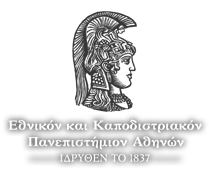Theories of second/foreign language acquisition/learning
Σοφία Παπαευθυμίου-Λύτρα
MA in Applied Linguistics
Course: Theories of second language acquisition/learning
Tutor: Sophia Papaefthymiou-Lytra
Spring 2012
The course is designed for students of applied linguistics with an interest in acquiring a strong background in the linguistic, cognitive, interactional and social foundations of language and, in particular, of interlanguage -- English as a foreign language, a well as in research methodology and a desire to apply this new-found knowledge to real-world situations as well as classroom situations where English is learnt and used as a means of communication with N and NN speakers alike
As a result of this integrative approach, student research will focus on understanding learner interlanguage development in EFL with particular reference to the Greek learner of English by exploring and developing Greek learner corpora in EFL. Students will feed this knowledge into the development of theoretical models for the study of phenomena such as classroom language learning and teaching, language assessment, languages in contact and English as a lingua franca among others.
For assessment purposes, students will be expected 1) to complete corpora research in an area related to language acquisition/learning and 2) to present their findings in writing as well as orally in class demonstrating the connection between theory and language learning/use bringing critical acumen to situations involving classroom language learning and teaching, language assessment, languages in contact and English as a lingua franca among others.
Bibliography
Βrown, H. Douglas. 2007. Principles of language learning and teaching. London:
Pearson/Longman
Ellis, R. 1999 Input-based approaches to teaching grammar: A review of classroom-
oriented research, Annual Review of Applied Linguistics, 19, 64-80.
Granger Sylviane. 2003. The international corpus of learner English: A new
resource for foreign language learning and teaching and second language
acquisition research. TESOL Quarterly, Vol 37/3 (538- 546).
Halliday M.A.K. 1975. Learning how to mean-Explorations in the Development of
Language London: Edward Arnold
Kellerman, E. 1995 Crosslinguistic influence: Transfer to nowhere? Annual Review of
Applied Linguistics, 15, 125-150.
Papaefthymiou-Lytra Sophia. 2009. ‘Communicating and Learning Strategies: Two
Faces of the same coin’. Journal of Applied Linguistics, Vol. 25 (27-46).
Papaefthymiou-Lytra, Sophia. 1987b. Language, Language Awareness and Foreign
Language Learning. Athens: The University of Athens Press.
Papaefthymiou-Lytra, Sophia. 1987a. Communicating and Learning Strategies in
English as a Foreign Language with Particular Reference to the Greek
Learner of English. Saripolos Library No 65. School of Philosophy. Athens:
The University of Athens.
Young, R. 1999 Sociolinguistic approaches to SLA. Annual Review of Applied Linguistics,
19, 105-132.
Λιγότερα
MA in Applied Linguistics
Course: Theories of second language acquisition/learning
Tutor: Sophia Papaefthymiou-Lytra
Spring 2012
The course is designed for students of applied linguistics with an interest in acquiring a strong background in the linguistic, cognitive, interactional and social foundations of language and, in particular, of interlanguage -- English as a foreign language, a well as in research methodology and a desire to apply this new-found knowledge to real-world situations as well as classroom situations where English is learnt and used as a means of communication with N and NN speakers alike
As a result of this integrative approach, student research will focus on understanding learner interlanguage development in EFL with particular reference to the Greek learner of English by exploring and developing Greek learner corpora in EFL. Students will feed this knowledge into the development of theoretical models for the study of phenomena such as classroom language l
MA in Applied Linguistics
Course: Theories of second language acquisition/learning
Tutor: Sophia Papaefthymiou-Lytra
Spring 2012
The course is designed for students of applied linguistics with an interest in acquiring a strong background in the linguistic, cognitive, interactional and social foundations of language and, in particular, of interlanguage -- English as a foreign language, a well as in research methodology and a desire to apply this new-found knowledge to real-world situations as well as classroom situations where English is learnt and used as a means of communication with N and NN speakers alike
As a result of this integrative approach, student research will focus on understanding learner interlanguage development in EFL with particular reference to the Greek learner of English by exploring and developing Greek learner corpora in EFL. Students will feed this knowledge into the development of theoretical models for the study of phenomena such as classroom language l
